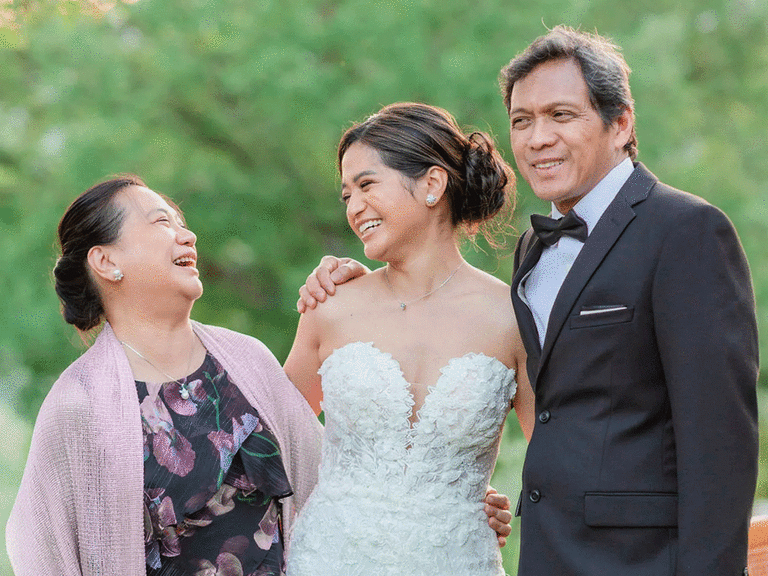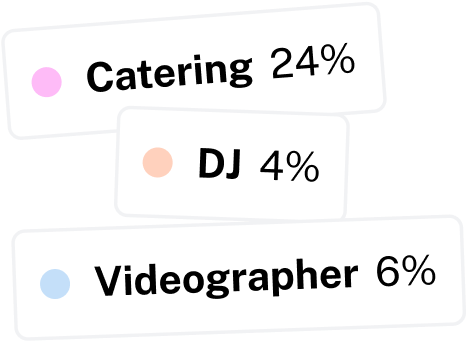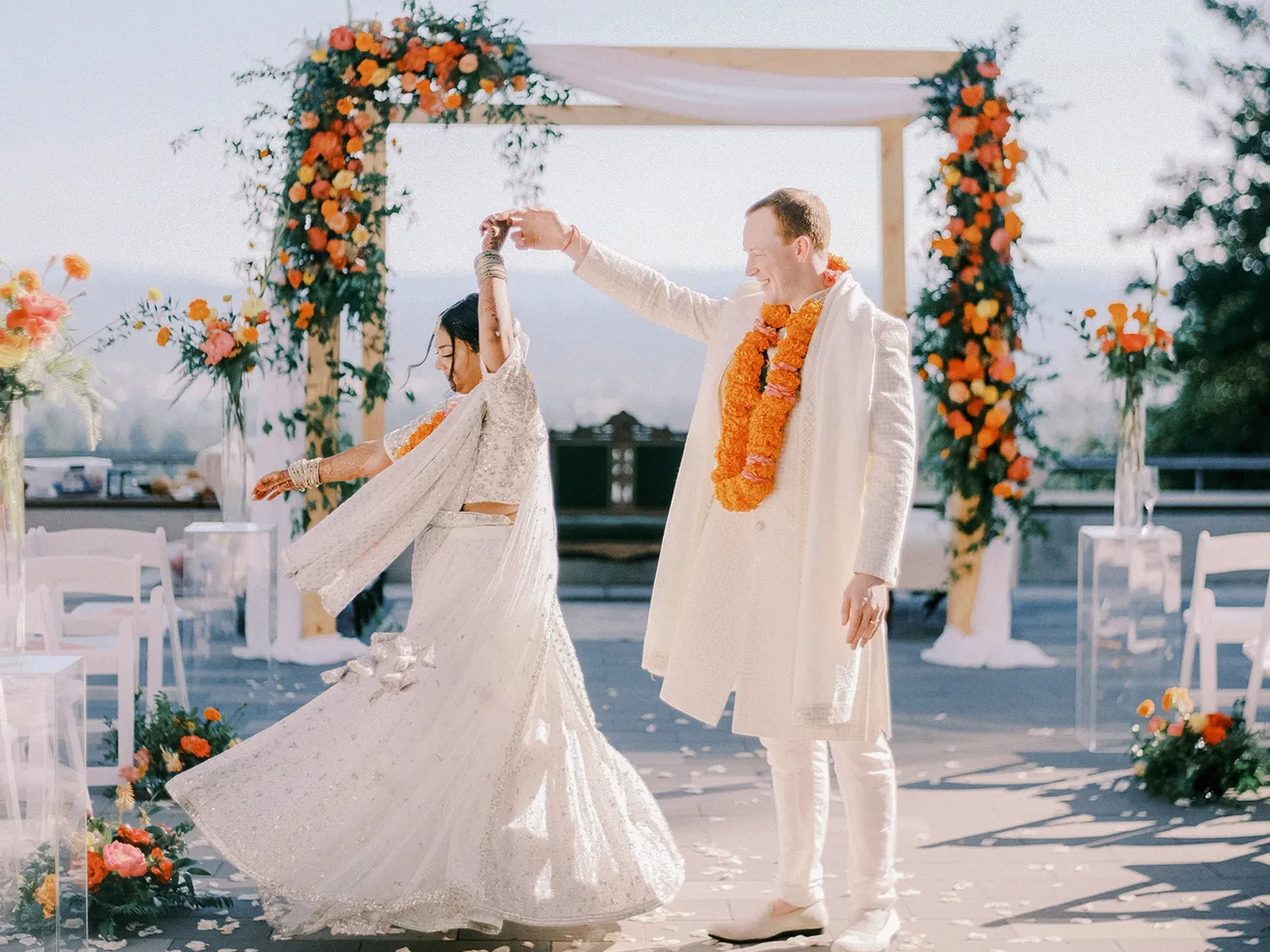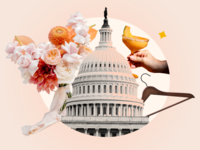What Does the Bride's Family Pay For Based on Tradition?
Having a wedding budget (and trying not to go over it) is crucial to you and your partner's wedding planning process. But before you can choose your wedding venue, you're likely wondering "What does the bride's family pay for?" You've likely heard of some wedding payment traditions and etiquette for couples (and their families) that identify as bride and groom. If you and your partner don't want to abide by traditional rules about what the bride's and groom's parents pay for, you're not alone. According to The Knot Real Weddings Study, couples and their families divided up wedding expenses equally. Newlyweds paid for roughly 48% of their wedding costs, and their parents typically paid the remainder of the bill (52%).
Discuss with your future spouse and both sides of the family what everyone is comfortable paying for. While talking with your loved ones, remember two things: Communicate openly and honestly, and whoever pays gets a say in the planning process. Finances can be stressful to talk about, especially when it revolves around one of the biggest days in your life, so try to be patient and open to suggestions.
When you're having these financial conversations you'll need to finalize who pays for what in the wedding budget or the amount they're willing to contribute. Whether you want to stick to tradition or just want an idea of how you and your family can split finances, here is a guide to the common wedding costs the bride's family pays for.
Pro tip: To learn more about how much items cost in your region, use our free budget tool to see what real couples typically pay.
What Does the Bride's Family Pay For?
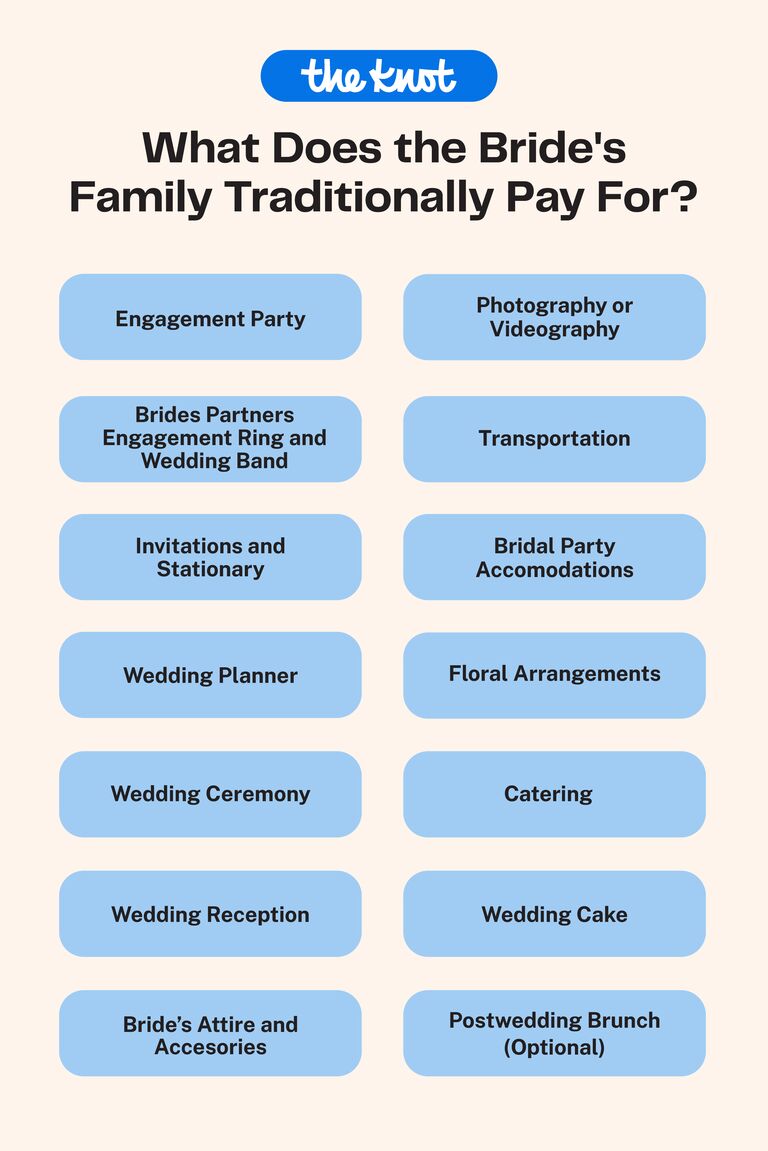
You may want to know what the brides's parents pay for whether you're following tradition or looking for suggestions. There's no right way to decide financial responsibility, so discuss what works best for you, your partner and each family. Here, we outline the traditional bride's family wedding expenses.
Engagement Party
It's up to the bride and their soon-to-be spouse if they want an engagement party. If the couple wants one, there's no strict tradition when it comes to who pays for the engagement party, so either the bride's or their partner's family can cover all the party expenses. If the bride's family wants to pay, they must host, plan and cover the food, drinks, decorations, possible rentals and the venue (if the party isn't happening at someone's home).
Bride's Partner's Engagement Ring and Wedding Band
Usually, each partner pays for their spouse's engagement ring and wedding band. If the bride can't afford the engagement ring and/or wedding band costs alone, the bride's family can help with the bill.
Invitations and Stationery
The bride's family is responsible for all invitation and stationery costs which, according to The Knot 2021 Real Weddings Study, cost an average of $530. Engagement announcement cards, engagement party invitations, save-the-dates, wedding invitations and RSVP cards are all factored into that average cost. The bride's family also pays for day-of paper (menus, ceremony programs and place cards), which cost $130 on average. (The Knot Invitations has a large collection of beautiful and customizable options to cover all your stationery needs, and you can also build a wedding website to help save on some stationery costs.)
Wedding Planner
Hiring a professional wedding planner is highly recommended, and one of the most important aspects of the wedding that the bride's family pays for. Wedding planners can help with many wedding planning responsibilities, from communicating with wedding vendors to staying within your wedding budget.
Wedding Ceremony
The biggest expense that the parents of the bride (traditionally) pay for is the wedding ceremony. The venue, décor and music are all integral parts of the ceremony. Discuss your dream wedding venue (religious institution or banquet hall?), your desired wedding theme (rustic or vintage?) and the song you want to walk down the aisle to (this determines what kind of musicians you'll hire) with your family. All of these choices impact your wedding budget, and exploring these vendor prices is made simple with the help of our free budget tool.
Wedding Reception
Similar to the wedding ceremony, the wedding reception venue, decor and music are paid for by the bride's parents. If you're looking for fun wedding entertainment ideas that will spice up your reception, consider hiring a live painter or tarot card reader.
Bride's Attire and Accessories
Not only does the bride's family pay for the wedding day outfit and accessories (veil, shoes, jewelry and more), but they're also responsible for the bride's wardrobe for all of the pre-wedding events (the shower, bach party, rehearsal dinner and honeymoon).
Photography or Videography
The bride's parents are financially responsible for hiring a wedding photographer or wedding videographer. We suggest having both vendors since these are essential ways to capture and relive all your wedding memories.
Transportation
Traditionally, the bride's family pays for all wedding transportation (rides to and from the venue) for the wedding party. If the bride's family offers, they are accountable for covering the costs of the wedding party's lodging as well.
Bridal Party Accommodations
Typically, the bride's family pays for the bridal party's accommodations. If paying for the bridal party's accommodations will make you go over your wedding budget, reserve hotel room blocks instead. By booking a block of rooms for your guests, the hotel can offer you a discounted rate that you can pass on to your wedding party. Also, try to reserve room blocks at hotels near your wedding venue to make transportation plans easier.
Floral Arrangements
The bride's family is expected to pay for the wedding flowers for both the ceremony and reception. The bride's family takes care of their wedding party's bouquets and corsages, too.
Catering
Typically, the parents of the bride pay for the wedding catering. Data from The Knot 2021 Real Weddings Study found that 57% of couples listed food and beverage as their number one priority during their wedding planning process. This means that a couple's wedding menu is a significant part of their wedding. Use your wedding menu as a nod to you and your partner's culture(s) or appreciate other cultures' cuisines (for example, serve a traditional Vietnamese feast).
Wedding Cake
According to an internal study, 75% of couples had a wedding cake on their special day. The bride's family pays for the wedding cake, but you don't have to stick to this sweet tradition. Cookies, cupcakes and pastries were popular dessert choices among couples in the 2021 study, too.
Postwedding Brunch (Optional)
The newlyweds or bride's parents can host and pay for the postwedding brunch. This event isn't necessary, but it's a fun way to share your newlywed bliss with loved ones at the end of the wedding weekend. You can also catch up with guests you didn't spend enough time with during your reception. So before you and your partner leave for your honeymoon getaway, use this time with your loved ones to thank them for joining the wedding celebration.
